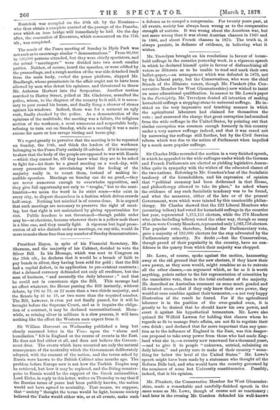Sir Charles Dilke seconded the motion in a very finished
speech,. in which he appealed to the wide suffrages under which the German and French Parliaments are elected as yielding legislative Assem- blies quite in sympathy with the wishes of the educated classes of the two nations. Referring to Mr. Goschen's fear of the Socialistic- tendency of the householders, and his expression of opinion that "political economy had been dethroned in that House,. and philanthropy allowed to take its place," he asked where the evidence of any such Socialistic tendency was to be found, and what the measures,. either of the late or of the present Government, were which were tainted by this unscientific philan- thropy. Sir Charles showed that the 222 Liberal Members who (counting tellers) had voted for household suffrage in the counties last year, represented 1,215,151 electors, while the 278 Members who (also including tellers) voted the other way, though so many of them were County Members, represented only 1,083,758 electors. The popular vote, therefore, behind the Parliamentary vote, gave a majority of 132,000 electors for the step advocated by the Parliamentary minority. No doubt ;—but the Conservatives, though proud of their popularity in the country, have no con- fidence in the quarry from which their majority was chopped.


































 Previous page
Previous page